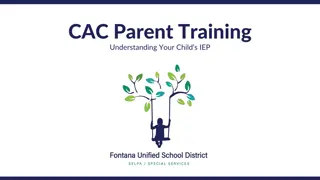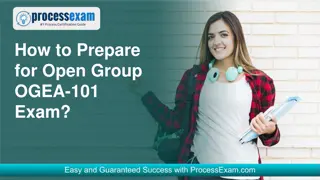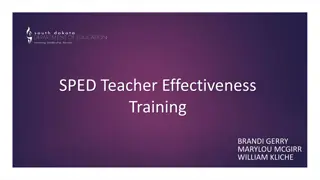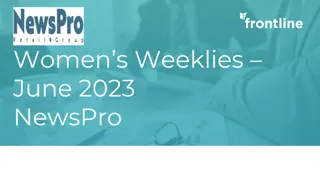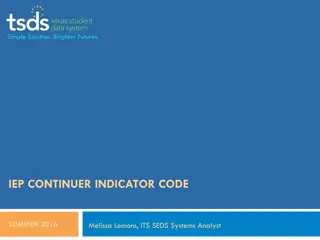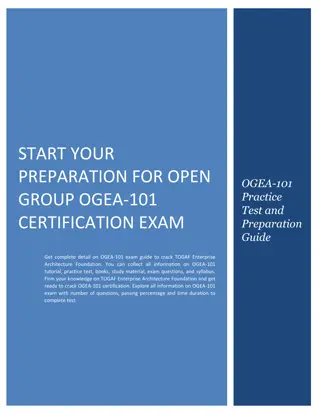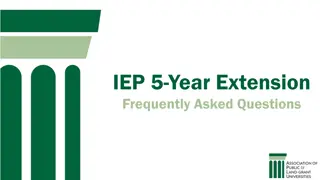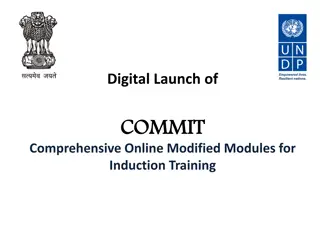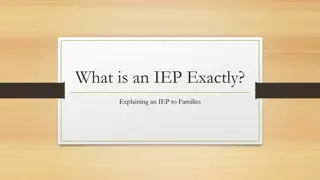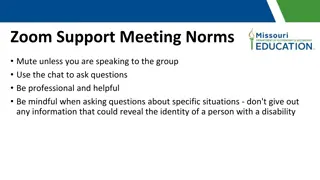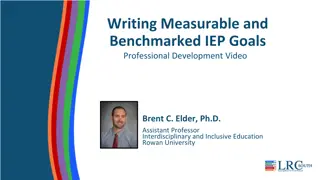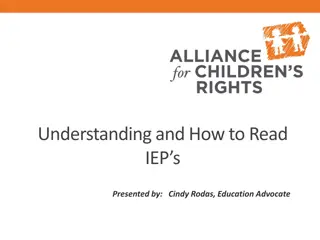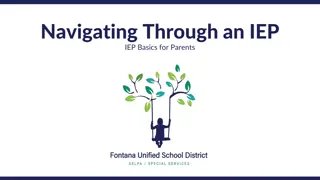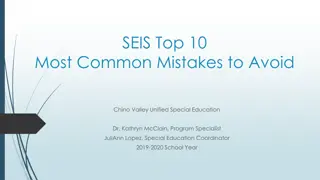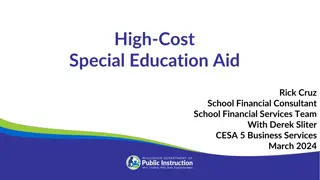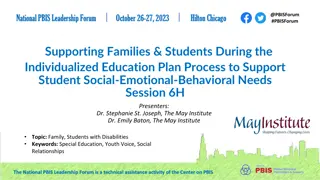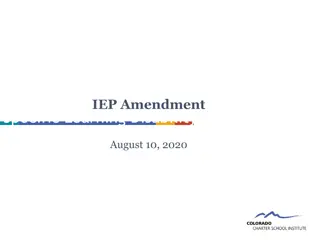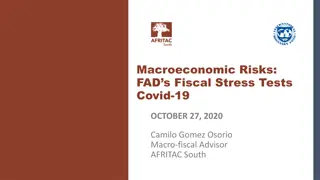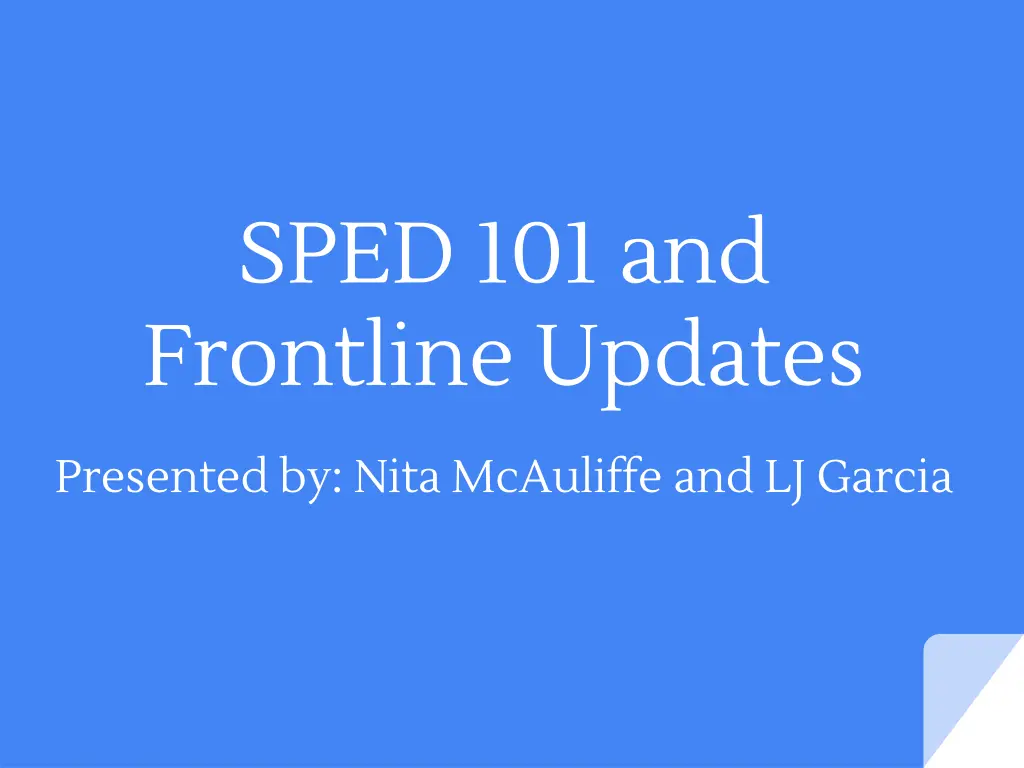
Understanding IEP Meetings and Procedural Safeguards in Special Education
Explore SPED 101 and Frontline updates presented by Nita McAuliffe and LJ Garcia, covering topics such as IEPs, team participants, and procedural safeguards in special education. Learn about the key points of procedural safeguards, parental rights, and the evaluation process for students in special education.
Download Presentation

Please find below an Image/Link to download the presentation.
The content on the website is provided AS IS for your information and personal use only. It may not be sold, licensed, or shared on other websites without obtaining consent from the author. If you encounter any issues during the download, it is possible that the publisher has removed the file from their server.
You are allowed to download the files provided on this website for personal or commercial use, subject to the condition that they are used lawfully. All files are the property of their respective owners.
The content on the website is provided AS IS for your information and personal use only. It may not be sold, licensed, or shared on other websites without obtaining consent from the author.
E N D
Presentation Transcript
SPED 101 and Frontline Updates Presented by: Nita McAuliffe and LJ Garcia
Topics for the day: SPED 101 Enrich Updates Website Updates and Resources Questions and Answer
Welcome to Holland read by Renay Jones "Welcome to Holland", by Emily Kingsley, and ready by Renay Jones
IEP Meeting Participants IEP Team Participants: Parent Student (if appropriate or 15+ - become student led in 9th grade) General Education Teacher - At least 1 teacher or specialist with knowledge in suspected area of disability Special Education Teacher Special Education Director or Designee (can not be excused from the meeting) As necessary: other qualified professionals such as OT/PT, SLP, school psych, RN
Procedural Safeguards http://www.cde.state.co.us/spedlaw/download/2011ProceduralS afeguards.pdf In these occasions: In these occasions: Initial permission to evaluate Due Process is requested Disciplinary change in placement Upon request Annual meeting - parents should receive a copy of Procedural Safeguards annually
Procedural Safeguards Key points to cover: parent access to student records, parent rights to ask that those records be amended, parent rights to participate in groups and meetings where decisions are made about their child s education, parent notification requirements (prior written notice and the procedural safeguards notice), and selected other safeguards (e.g., independent educational evaluation, surrogate parents, age of majority).
IEP Evaluation Consider strengths and needs, as well as concerns about the student Identify data Team already has, and data needed to determine eligibility Prior Written Notice & Consent for Evaluation
PLAAFP Data in PLAAFP suggests need(s) get away from stating See attached Statement of the child s present levels of academic achievement and functional performance compliance vs. quality (Appendix D Pg. 135) Statement about progress on goals and post secondary goals for Transition IEP s
Annual Goals Measurable goal should align directly to PLAAFP Prioritize & consolidate goals as appropriate Standard(s) reflected after goal Unit of measurement (criteria) relate to skill being taught (SMART goals) Objectives: Only required for students taking state alternate assessment(s)
Goal Criteria SMART Goal Criteria Specific Measurable Achievable Reasonable Timeline
Goals -Link to State Standards Make sure we are aligning goals to standards. If we forget to align one goal, it will not meet compliance Every discipline needs to be doing this Examples: Appendix d Pg. 12 CDE quotation It is denial of FAPE if not making growth on annual goals year after year . (year after year with same goal and lack of progress). For Transition to Adulthood Focus on skills to be in place 12-24 months AFTER graduation.
Progress Reporting Must report about the student s progress toward achieving the annual goal Include supporting data (e.g. graphs) Completed as often as general education report cards
Accommodations vs. Modifications
Modifications Modifications are typically utilized for those students who are supported through Extended Services We are making modifications to the standards so that the child can access the general curriculum Resource students typically do not need any curricular modifications
Forms to be uploaded due to signatures Permission for evaluation Initial consent of Services Amendment Attendance at IEP meeting (parent also signs they received rights) Eligibility determination disability pages
File Review Reminders Statement of the child s present levels of academic achievement and functional performance compliance vs. quality Statement about progress on goals and post secondary goals for Transition IEP s Concerns of the parent (remember this is not always negative) link to PWN Goals are measurable, reflected in present levels and aligned to standards Statement describing whether the child will achieve local or individualized standards Child is removed from regular education environment only when the nature or severity of the disability cannot be achieved satisfactorily even with supplementary aids and services
Frontline Dashboard Notice of Meeting Create an IEP Progress Monitoring - how to Uploading of documents Finalizing - report to Records clerk IEP Amendments Batch printing Audit logs Tips: Administrator use can see who has accessed a student at anytime. If a student moves please turn in change of status.
Web Site Resources Tour of www.slvboces.org Indicator 13 Tips Manual Related Services Providers
Parent Survey Requirements/Information about Parent Surveys Responsibilities of Case Managers
Question and Answer Getting our ducks in a row!

